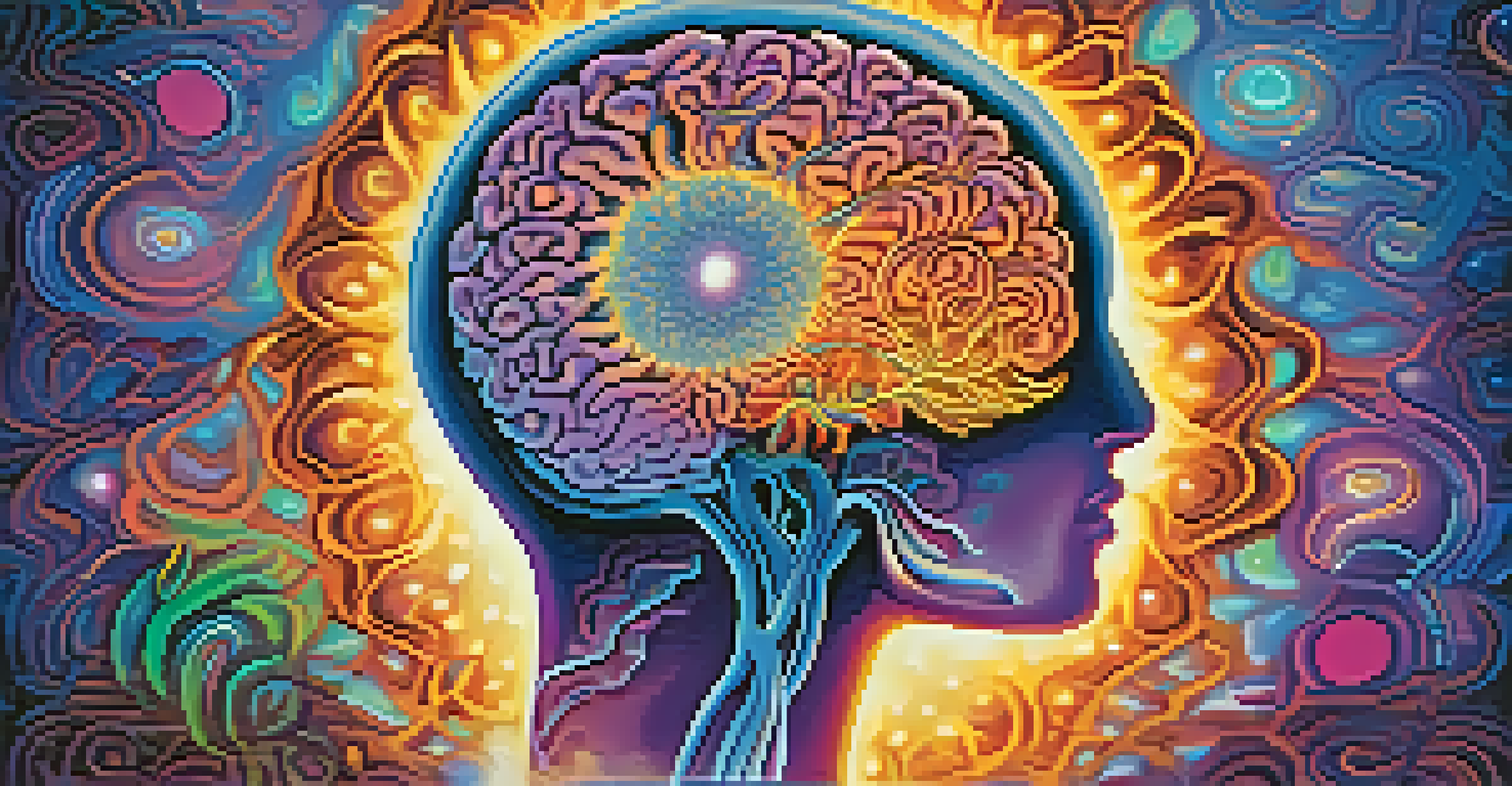Ayahuasca and the Brain: Therapeutic Benefits and Health Risks

What is Ayahuasca and Its Origins
Ayahuasca is a powerful psychoactive brew traditionally used in Amazonian shamanic practices. Made from the vine Banisteriopsis caapi and other plants, it holds deep cultural significance for indigenous communities. This sacred drink has gained global attention for its potential therapeutic effects, particularly in mental health.
The experience of Ayahuasca can be a deeply transformative journey, often leading to profound insights and emotional healing.
The brew contains DMT (dimethyltryptamine), a compound known for its hallucinogenic properties. When combined with the MAOI (monoamine oxidase inhibitor) properties of the vine, it allows for profound, introspective journeys. Many participants report transformative experiences that can lead to emotional and psychological healing.
While Ayahuasca has been celebrated for its spiritual and therapeutic benefits, it’s important to understand its origins and the respect owed to the cultures that use it. The wisdom of these traditions emphasizes the need for careful consideration and guidance.
Therapeutic Benefits of Ayahuasca for Mental Health
Research has shown that Ayahuasca may help alleviate symptoms of depression, anxiety, and PTSD. Some studies suggest that the brew encourages neuroplasticity, allowing the brain to form new connections and pathways. This can help individuals process trauma and gain new perspectives on their lives.

Many users report profound emotional releases during their Ayahuasca experiences, leading to increased self-awareness and personal insight. These revelations can foster a sense of connection to oneself and the universe, offering healing that traditional therapies may not provide.
Therapeutic Benefits of Ayahuasca
Ayahuasca shows promise in alleviating symptoms of depression, anxiety, and PTSD through its unique neuroplasticity effects.
Moreover, the setting in which Ayahuasca is consumed—often a supportive, communal environment—can enhance feelings of safety and belonging, further contributing to its therapeutic effects. However, it’s essential to approach these sessions with caution and respect.
Potential Health Risks of Ayahuasca Use
While many people have positive experiences with Ayahuasca, it is not without risks. The intense psychological effects can lead to overwhelming experiences, including anxiety, paranoia, or even psychosis in susceptible individuals. For those with a history of mental health issues, these risks may be amplified.
Psychedelics can help us to see our patterns of thought and behavior clearly, providing a new perspective on our lives.
Physical side effects can also occur, including nausea, vomiting, and diarrhea, often referred to as 'purging.' While some view this as a necessary part of the healing process, it can be distressing for first-time users. Understanding these potential reactions is crucial before participating in an Ayahuasca ceremony.
Furthermore, Ayahuasca can interact negatively with certain medications, especially antidepressants. Therefore, consulting a healthcare professional prior to consumption is highly advisable to ensure safety.
The Science Behind Ayahuasca and the Brain
Ayahuasca's effects on the brain are an area of growing scientific interest. Studies suggest that it may increase levels of brain-derived neurotrophic factor (BDNF), which plays a crucial role in brain health and cognitive function. This increase could be responsible for enhancing mood and reducing anxiety.
The psychedelic component, DMT, is thought to activate serotonin receptors, particularly the 5-HT2A receptor, which is involved in mood regulation. This activation can lead to altered states of consciousness and profound emotional experiences, which some believe contribute to its therapeutic effects.
Cultural Context is Crucial
Understanding the cultural significance and traditions surrounding Ayahuasca is essential for respectful and meaningful engagement.
Understanding these processes not only sheds light on how Ayahuasca may facilitate healing but also emphasizes the importance of responsible use. As research continues to evolve, we may uncover more about the intricate relationship between Ayahuasca and brain function.
Cultural Significance of Ayahuasca in Healing Practices
Ayahuasca has been used for centuries by indigenous cultures as a spiritual and healing tool. Shamans, or healers, guide participants through the experience, which is seen as a journey into the self and the spirit world. This cultural context is vital for understanding the brew's profound effects.
The communal aspect of Ayahuasca ceremonies promotes a sense of belonging and shared experience, which can amplify the healing potential. Participants often bond over their journeys, creating supportive networks that last beyond the ceremony itself.
Respecting and acknowledging these cultural practices is essential for anyone considering Ayahuasca. Engaging with indigenous traditions in a meaningful way fosters a deeper connection and appreciation for the knowledge they hold.
Finding Safe and Responsible Ayahuasca Experiences
If you’re considering Ayahuasca, it’s crucial to seek out reputable retreats that prioritize safety and ethical practices. Look for facilitators with a strong background in both the spiritual and psychological aspects of the experience. Their guidance can greatly influence the outcome of your journey.
Safety protocols, such as screening participants for medical conditions and providing a supportive environment, are essential components of responsible Ayahuasca experiences. A well-structured setting can help mitigate potential risks and enhance the therapeutic benefits.
Risks Must Be Acknowledged
Potential psychological and physical risks associated with Ayahuasca usage highlight the importance of caution and professional guidance.
Additionally, consider joining community discussions or forums to learn from others’ experiences. Engaging with a community can provide insight and support, helping you navigate your own journey with informed confidence.
Conclusion: Weighing the Benefits and Risks of Ayahuasca
Ayahuasca presents an intriguing blend of therapeutic potential and health risks. While many have found healing and insight through its use, it’s essential to approach it with caution and respect. Understanding both sides allows individuals to make informed decisions about their mental health journey.
As interest in Ayahuasca continues to grow, so does the importance of research and open dialogue about its effects. By sharing experiences and knowledge, we can create a more nuanced understanding of this powerful brew.

Ultimately, whether you’re drawn to Ayahuasca for spiritual exploration or therapeutic benefits, weighing the risks and benefits is key. With the right preparation and mindset, it may offer a path to healing that resonates deeply with many.